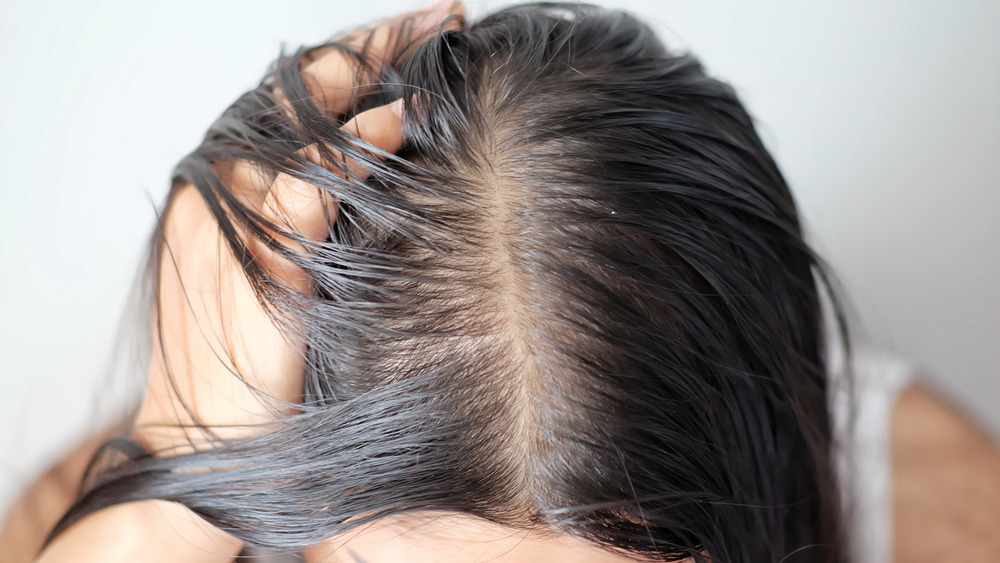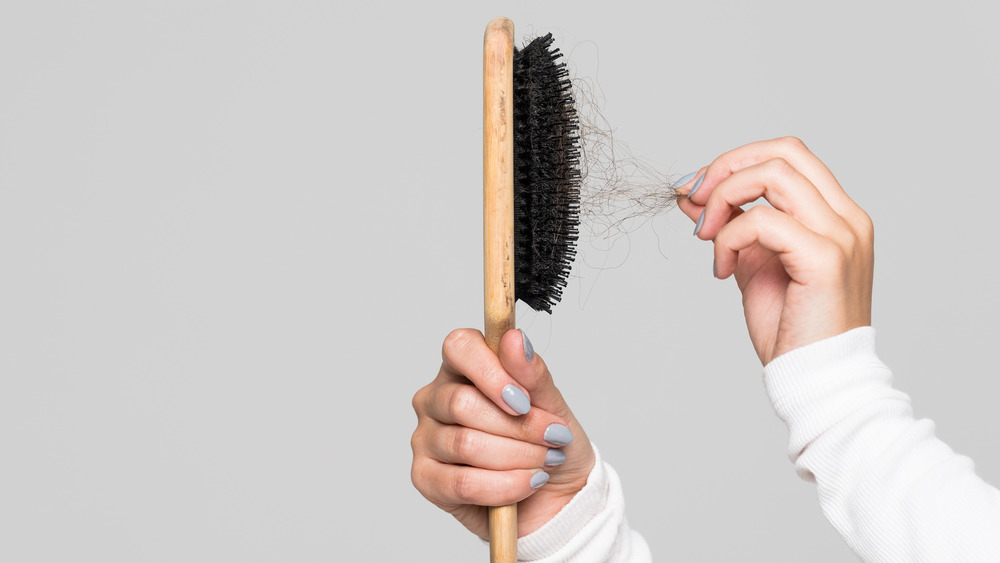Hair Loss Myths You've Been Believing
Thinning strands may be a part of your life. Whether you're losing hair after you shower or noticing patches starting to look sparse, hair loss is something that has sparked a number of theories with no scientific basis. So, if you're noticing a change in the way your mane looks, it may be time to see if you're subscribing to old school myths about hair loss and, instead, start to take action to care for your strands.
The List recently spoke with Bill Edwards, Hair Loss Prevention Specialist and the CEO of Regenix, about commonly believed myths that many people maintain when it comes to hair loss. From tying beliefs about hair growth to genetics to thinking that your shampoo may be the culprit, these myths can derail an otherwise effective treatment schedule. Since nearly 35 million men and 21 million women struggle with hair loss, The Hair Society reports, it makes sense that those suffering from baldness may follow untrue advice in an effort to keep their strands.
Here are a few of the most pervasive falsities about thinning hair that you can ditch once and for all.
Myth #1: My grandmother lost her hair, I am destined to lose mine also
Many people who struggle with hair loss believe that they can blame their family members for this misfortune. While there is some truth to this idea, Edwards explains that it's largely over exaggerated. "One can inherit a susceptibility to hair loss, and it can come from either side of the family, and from generations past, but it is just that, a susceptibility, it is not a forgone conclusion," he says.
Just like if someone has suffered from a certain illness in your family, it's important to take precautions, but that doesn't mean you automatically have it. "Think of the analogy of heart disease," Edwards explains. "You can inherit a susceptibility to it, but you don't inherit a heart attack. It just means that you have to look after yourself more so than an individual without that genetic susceptibility."
So, if hair loss is an issue in your family, start to take proactive measures like caring for your scalp and eating well, but don't take baldness as inevitable. Furthermore, if you're still concerned that this may be an issue for you down the road, you can find proactive treatment options like the ones Regenix offers.
Myth #2: Frequent shampooing causes hair loss
Lots of women don't enjoy washing their hair — and for good reason! Washing, drying, detangling, and styling can take a lot of work. Plus, it seems like every stroke of the comb can carry with it damaged strands of hair. But, it appears that the daily shed from washing your hair may actually be something else besides a chronic issue.
"Many people mistake hair fall for hair loss. There is no 'normal' amount of daily hair fall, and it can vary with the seasons," Edwards notes. Furthermore, avoiding washing may actually be doing more harm than good. "A common myth is fueled when someone experiences normal hair fall when they shampoo, consequently, they don't shampoo as often as they should. If you lose 100 hairs every time you shampoo, you will lose 700 hairs over the course of a week, if washing daily. If you only wash your hair once a week, you will likely lose 1000," he says.
To avoid this issue, shampoo your strands at least three times a week. Edwards also suggests taking a look at your products to make sure that they're gentle enough on your hair and scalp. Having the right shampoo can either make or break your hair care routine.
Myth #3: Hair is never the same after chemotherapy
Lastly, many people believe that your strands can never bounce back to their pre-medical treatment appearance. Fortunately, Edwards explains, this is far from the truth. "My advice has always been to be patient, give it 6 to 9 months after the last chemo treatment, chances are it will come back on its own," he says. "If it doesn't, or if it comes back a different texture, then Regenix can help to enhance it."
Another piece of advice that he suggests is avoiding wearing a wig too frequently throughout this process. "One problem with the chemical-induced hair loss is the psychological loss of femininity. There are many fashionable ways to cover your head and still look your best, but if you choose the traditional full wig, be sure to only wear it when necessary. Wearing a wig constantly can cause problems within the hair follicles and impede the new growth." As for prevention, the same rule applies: continue to monitor what types of products you're using on your scalp. The fewer chemicals, the better.
While various conditions and lifestyle choices may make way for thinning hair, there are a few common misconceptions that you can stop believing. As long as you care for your strands and stay proactive in your approach, your hair can stay the voluminous, healthy mane you've always wanted.



